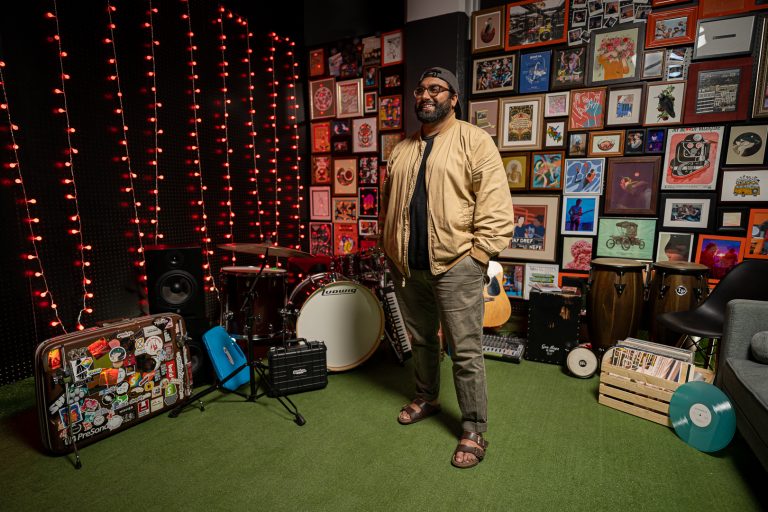Amit Mehta, founding partner at Good Company Productions, remembers the beginning of the pandemic vividly. Their team had partnered with photographer Taylor Jones of Someone’s Studio to host a launch party at their new 44 Gaukel St. location in Kitchener.
“I remember the very last ticket the morning of [Mar. 12]…the very last registration that we had was from Mayor Berry,” Mehta said. “By that afternoon it had gone from ‘yeah, the mayor is going to be coming to our event’ to ‘we need to shut this whole thing down’.”
Prior to COVID-19, Good Company Productions was best known for hosting live music experiences around KW at pop up concerts and community events. In Mar. 2020, that all changed. Suddenly, the future seemed uncertain.
“As we got through that first month [of the pandemic]…people weren’t leaving their homes, people were barely even looking at each other if you were downtown. It was crazy,” Mehta said.
Good Company Productions quickly realized the impact the pandemic would have on the community. While they shifted their operations to remote platforms, their focus moved away from the business itself and towards local musicians and artists who were now struggling to find opportunities to make an income.
“A lot of the folks locally that are pursuing music are doing it part time while working, typically a service-based job for the rest of the time. And both of those sources of income…vanished instantly,” Mehta said.
Good Company Productions spent the first couple months trying to help artists with their sales of merchandise using their website’s Band Shop, a platform that hosts merchandise for local musicians for free. That initiative assisted artists until there was more financial support available from the government.
But by the end of April, the team needed to face a harsh reality. The ability to host live in-person shows, even outdoors from a distance, was not going to happen anytime soon. So, they decided to pivot into virtual programming.
But for local musicians, the pandemic created more barriers than most people would consider.
“If it’s not a solo artist or if they don’t already live together, these musicians don’t actually have a chance to get together and prepare for opportunities that we might be creating for them.” Mehta said.
“I can give them a gig, but if they’re not prepared to take it, then they’re missing out on that income,” Mehta said.
Mehta said visual artists have faced similar challenges because they are often used to displaying their work at vendors markets. Artists are now displaying their work in a much more concentrated and oversaturated virtual space.
Good Company Productions has been looking for ways to loop visual artists into the opportunities they’re creating for local musicians. For example, they have been giving visual artists full control over live sets at 44 Gaukel St.
“[It’s] something that they wouldn’t be able to do in a non-COVID world, right? It’s specifically designed for this type of medium that we’re in,” Mehta said.
Mehta and his team partnered with the Zehr Group and the City of Kitchener to offer a recording space for local musicians to use throughout the month of April. The space was used to record live off the floor performance videos artists could use towards festival and grant applications to kickstart their music career ahead of the summer.
Good Company Productions has also tried to facilitate ways to connect via virtual shows through chat or audience engagement and Q&A sessions. Mehta said there is a lot that can be replicated virtually but said nothing compares to the live performance experience.
“You’re never going to be able to recreate that connectivity of sitting in a room together, or dancing together or feeling that energy together,” he said.
Determined to overcome the barriers COVID-19 has imposed on live music, Mehta created a 10 ft. by 10 ft. plexiglass structure with lights around the edges. The structure, Mehta refers to as “the cube,” is meant to fully isolate bands from their audience during performances.
“It is actually built from plastic that was donated to us by a Canadian shield. So, it’s the same plastic that has been going into the shields and masks they’ve been making throughout the pandemic,” Mehta said. “The only thing that would be safer to do would be to practice music abstinence and just not go see them,” he laughed.
While artists continue to create in isolation, many have speculated we’ll see a creative boom the way we have following times of trauma in the past. Mehta said he does believe there will be a lot of art born out of the pandemic but hopes everyone will recognize that artists are also dealing with the pressures the rest of us are coping with.
“When you’re looking at folks that work in a creative space…give them a little bit of slack, because they’re trying their best to get all this up and running as quickly as possible. But we’ve been pivoting nonstop every day for the last year, and that takes its toll.”

